
By Tony Holler
I am not Charles Darwin. I am a track coach. I also coach football.
Fifteen years ago I found a better way of coaching sprinters. To sum it up, I began coaching quality over quantity. You don’t get fast by running slow.
My sprinters never run more than 200 meters at a time … ever. Almost all of our training is done at max speed. Timing the 40-yard dash or a 10-meter fly is fundamental to the program. Our practices never last an hour.
Everyone’s first question is, “But how do you train your 400 runners?” The answer is simple; I train all my sprinters the same way.
My kids run fast because I time everything. Almost every practice involves “RECORD, RANK, & PUBLISH.” See the blog I wrote last winter, Inertia and Data Driven Speed Training.
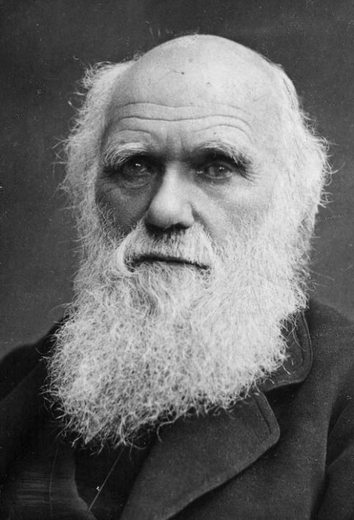
“I have steadily endeavored to keep my mind free so as to give up any hypothesis, however much beloved (and I cannot resist forming one on every subject), as soon as facts are shown to be opposed to it.” — Charles Darwin
Fifteen years ago I felt very alone. Everyone coached the old-school way. Now there are many sprint coaches just like me.
The less-is-more, speed-based model of track & field works so well, it’s become my mission to spread the word. Like an evangelical preacher, I speak at clinics every winter. In the past two years I’ve written twenty-four blogs for ITCCCA (Illinois Track and Cross Country Coaches Association) trying to convince coaches that my system works. More important, my system is good for kids. There have been many converts.
I’m somewhat outspoken when it comes to those coaches that cling to that “Old Time Religion.” There are coaches who refuse to listen to new ideas. They stubbornly coach the only way they know … the way they were coached. These coaches believe training is a miserable grind, pure and simple, no avoiding it. Pain and suffering is fundamental to success. “Pain is weakness leaving the body.”
“I did not come to bring peace but a sword. For I have come to ‘set a man against his father, a daughter against her mother, and a daughter-in-law against her mother-in-law” Mathew 10:34
I may sound like a preacher but I’m no “Track & Field Jesus” … however, some things need to be shouted from the rooftops.

“Without deviation from the norm, progress is not possible.” — Frank Zappa
Once preaching gets into your blood, it’s hard to quit. Now I’m attempting to change the way football is coached. Could football be coached the way I’ve coached sprinters for the past fifteen years?
Track and field seems to be the sport of science. Everything is quantified. Track coaches study anatomy, physiology, kinesiology, physics, and biochemistry. Football is more qualitative. Football sometimes borders on being primitive. Football is our most war-like sport. If you haven’t seen George Carlin’s hilarious monologue, check it out: Baseball vs. Football
An alarming percentage of football coaches think they are the reincarnation of General George Patton. Maybe they are. Patton believed in reincarnation. Maybe football coaches have watched “Remember the Titans” one too many times. I have no use for reverse-evolution in sports.
If I have offended you, stop reading now. Go back to Fox News. Join a militia and see if you can take your country back. Make plans to visit the Creation Museum in Petersburg, KY. Re-read Dick Cheney’s last book. Get back to your “Bigger, Fatter, Slower” studies. Resume your double sessions with your indentured servants. Keep believing that toughness, courage, and heart will win football games. Bring in a Navy Seal to give a motivational speech. Pray to the weight room gods and curse your lack of speed. Continue being a Neanderthal. I have no use for you.
Ok, maybe I went a little overboard. Sorry. I will keep this positive from this point forward.
If you “have steadily endeavored to keep your mind free so as to give up any hypothesis as soon as facts are shown to be oppose to it” … read on.
Sprint-Based Football
I want to introduce you to Lou Sponsel, Head Football Coach at Palatine Fremd High School in Palatine, IL. Fremd is a school of around 2800 students located in a wealthy suburb of Chicago. In football, Fremd is class 8A in an 8-class system.
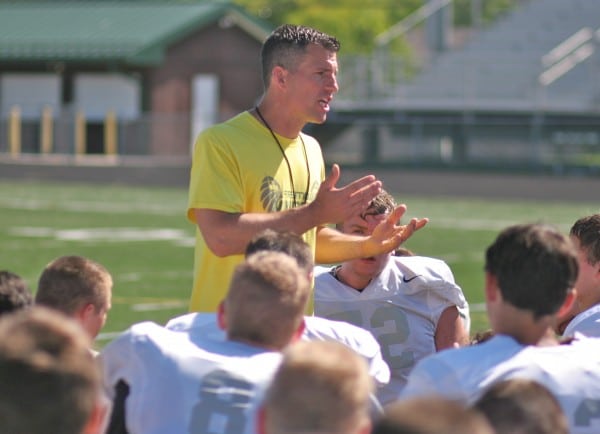
Palatine Fremd High School Head Football Coach Lou Sponsel
I met Lou six years ago. The head track coach at Fremd, Jim Aikens, brought a group of coaches and athletes from Fremd to experience my way of training sprinters. Lou Sponsel was in that group of coaches. Six years ago, Lou Sponsel was getting a masters degree in Exercise Physiology. My theories and his studies combined to create one of those epiphanies. Lou was a convert.
At the time, my training of sprinters relied heavily on hand-held 40 times and automated 10m fly times using the Summit Timing System. When Lou bought the automated timing system, he told me it “was like cocaine to sprinters”. They couldn’t get enough of it. The Summit System worked so well, he bought another. The system costs over $2000.
Lou adopted my speed training ideas:
- No one gets fast by training slow
- Anything you do for more than 5 seconds is NOT speed training
- Rest is critical to performance
- Tired sprinters develop bad habits and learn to run slow
- Speed grows like a tree … therefore speed training must be year-round
- The best speed drill is a timed sprint
- “Record, Rank, & Publish”
Speed became the focus of sprint training at Palatine Fremd. I know, that sounds ridiculous … speed as the focus of sprint training … but many misguided coaches train sprinters though arbitrary numbers of intervals done at sub-max speed. Dumb track coaches over-train their sprinters. Fast kids quit the team. Those that stay lose their bounce. Many get injured. Yes, there are track coaches who are as misguided as stone-age football coaches. “Any fool can make another fool tired.”
The commitment to speed began at Palatine Fremd in 2008. Lou Sponsel became the head football coach at Palatine Fremd in 2012. In 2011, I asked Lou Sponsel, “Do you think that football could be coached the way we coach track?” Lou did not hesitate. “I think it could be done.”
In 2012 Lou took over a Palatine Fremd football program that had been coached in the traditional manner for many years. The program took pride in “the grind”. Typical weekday practices included one hour of weightlifting followed by nearly three hours of practice. Coaches had full workdays on Saturdays and Sundays.
Head football coaches always talk about family but for three months a year they might as well be doing a tour in Afghanistan.
Coach Sponsel noticed how old-school football programs robbed kids of their “fire” and their “edginess”. The “fun factor” disappeared. By Friday night players had “heavy eyes.”
What would happen if football players (all of them) were coached like sprinters? What if football players had a chance to “reboot” and “refresh” their Central Nervous System? Would happier, healthier, and faster players win games? Could they beat old-school teams?
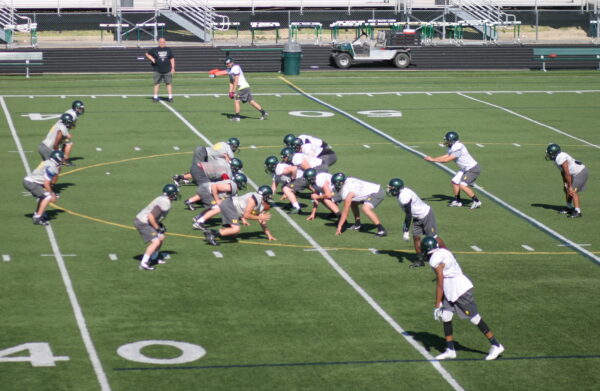
Check out the time spent practicing football at Palatine Fremd:
- Monday: 40 minutes (helmet only)
- Tuesday: 100 minutes (full pads)
- Wednesday: 90 minutes (shoulder pads & helmet)
- Thursday: 45 minutes (helmet only)
Do the math. The total time on the field is less than five hours per week. There are teams that spend twice the time for half the success.
In addition to on-the-field practice time, Fremd has 8th period P.E. for athletes. Monday and Wednesday is spent in the weight room. Tuesday and Thursday looks more like a track practice … running mechanics, hip flexibility, foam rolling, and sometimes, brace yourself … yoga.
When I visited on a summer day, half the players went to the weight room while the other half went to pilates.
The players aren’t the only ones with a reduced work load. Football coaches at Fremd do most of their video work at home. Every sophomore and varsity football player has a Hudl account and has assigned video to watch in preparation for the next game. With a flexible and less time-consuming football load on the weekend, coaches approach the upcoming week with a more energetic and enthusiastic mindset. When you combine the relatively free and easy weekends with reduced practice times, coaches benefit as much as players.
Rest is a natural performance enhancer for players AND coaches.
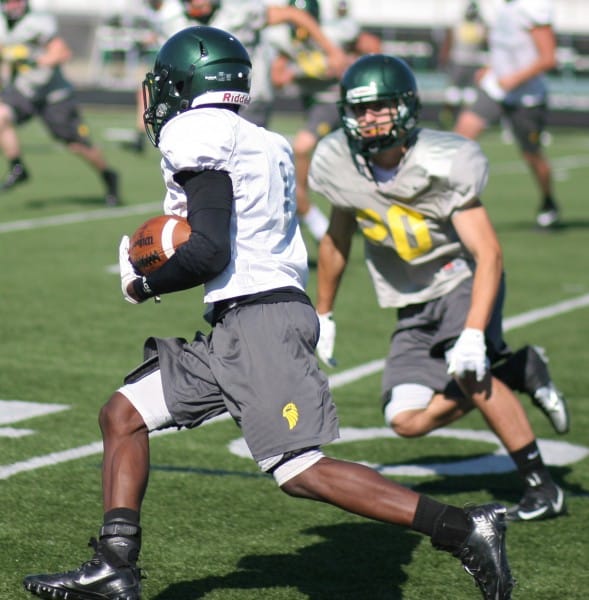
High speed action does not happen when players are physically and emotionally depressed. You can’t be FAST when you are tired. If you don’t believe me, test it. Measure top speed using Freelap at the start of practice. Then work your team for three hours and test top speed again. TIRED ATHLETES PRACTICE SLOW.
How about this interesting tweak to Lou Sponsel’s practice plans … if Fremd is playing a weak opponent, practice times may be increased by 10 minutes per night. If the upcoming game is expected to be a fight to the finish, practice times may be decreased by 10 minutes. Why? Think sprinters. Think fast, bouncy, energetic, healthy, excited, and edgy.
When asked why old-school coaches practice longer and harder for big games, Lou has an answer, “Football coaches coach to their own insecurities. Sometimes they defend ghosts. Do you really have to be prepared for EVERY scenario? How many times must you practice the same play?”.
When I think of Paul “Bear” Bryant, I picture the gruesome “conditioning” done at the end of his practices. To this day, football coaches think wind-sprints and up-downs are critical to success. Palatine Fremd NEVER does “conditioning” at the end of practice. Never.
Palatine Fremd has made the playoffs in both of Lou Sponsel’s first two seasons. This year they are poised to go deep into the playoffs.
Why the optimism?
#SpeedKills
After six years of training sprinters like cats and two years of training football players like sprinters, the planets are lining up.
Lou Sponsel’s sprint crew had a great spring. All three school records fell. In the 51-year history of Palatine Fremd no relay teams had run faster than 42.26, 1:27.97, and 3:20.12. These relay teams were composed of five football players.
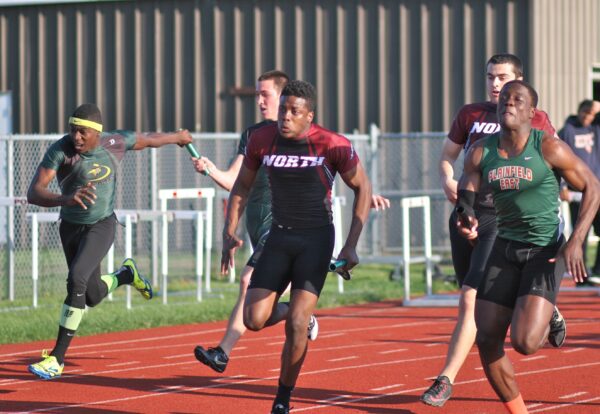
Palatine Fremd broke their school record in this relay. On the far left you see Kyle Lewis (#19) handing off to Jawan Gaines (#1). My guy, Annile Williams, of Plainfield North is in the middle. Every guy in this picture is a football player. #SpeedKills
All of Sponsel’s best sprinters play football.
Have you heard old-school football coaches discount “track speed” as opposed to “football speed?” Ha!
The fastest sprinters are the fastest guys going forwards, backwards, sideways, and any combination of the above. I’ve done the testing. Have you?
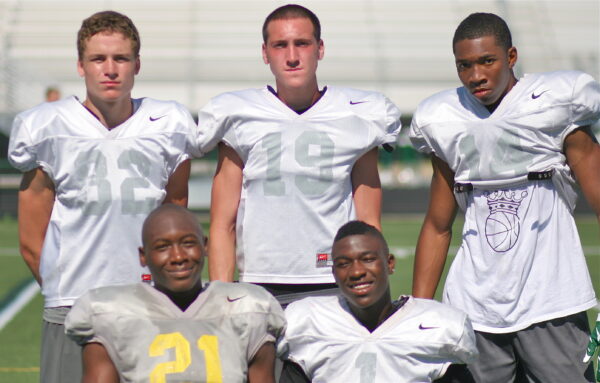
I introduced you to #19 (Kyle Lewis) and #1 (Jawan Gaines) in the previous picture. #32 is Ryan McMahon, #14 is Kenny Lyke, and #21 is Richard Adugba. These five guys were responsible for setting all three sprint relay records at Fremd last year. All five return.
Speed is a twelve-month process at Palatine Fremd
Track and field is the first PE unit of study for incoming freshmen at Fremd. Why track in the fall? Why not? The first experience for incoming freshmen is part track and field and part NFL Combine. Freshmen are taught to sprint. Freshmen are timed in the 40 and 10m fly. Times are “RECORDED, RANKED, AND PUBLISHED.”
After using his Summit Timing Systems for three years, Lou has gone to Freelap timing. Freelap doesn’t blow over in the wind. Freelap is light and easy to transport. It is wireless and can time multiple runners at the same time. The uses of Freelap seem to be limited only by one’s imagination. After six years of Summit, I’m also making the switch to Freelap.
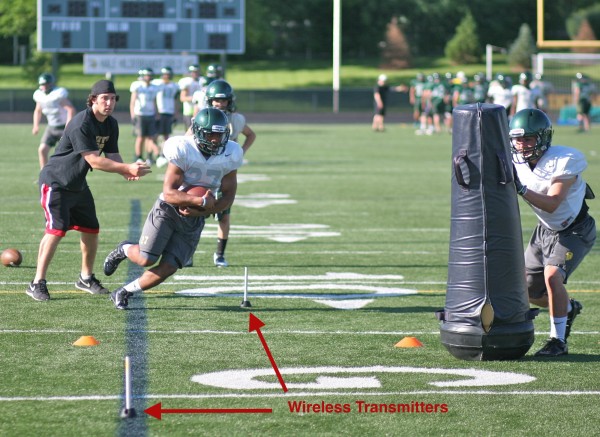
Whatever you want to test, you can do so with Freelap. Here the transmitters are 8 yards apart. Running backs had best times of 1.17 and 1.24. The better running back had the better time … no surprise. The fact that every rep is done at 100% because the running back is being timed is the hidden beauty of automated timing. There was actually a third transmitter to the right. Whenever the runner passes within a meter of a transmitter a time is recorded.
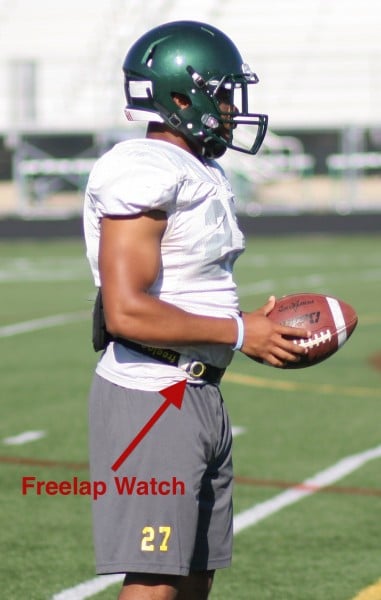
No one would notice the stopwatch on this running back’s belt. Someday this technology will be standard football equipment in all schools.
Palatine Fremd has spent lots of money on Freelap. Fremd received a grant from IBM to use Freelap for sprint training in conjunction with their Applied Science classes. Freelap is used for athletics and academics. Perfect.
Presently Fremd has eight watches and nine transmitters. Eight more watches have been ordered. Lou Sponsel hopes to order another eight watches soon, making the total number of watches twenty-four.
High school football has become a numbers game like track and field. In my opinion, you must get a minimum of 60 freshmen, 45 sophomores and 45 varsity athletes to have a solid high school football program. Concussion fears have already impacted football turnouts. I’ve seen big schools have only 90 boys out for football. You can’t win with 35 freshmen, 25 sophomores, and 30 varsity football players unless you are playing in a small-school league. Palatine Fremd had 228 out for football last year. I repeat … Palatine Fremd had 228 out for football last year.
Would shorter practices, happier coaches, and lots of general enthusiasm increase high school football turnouts? Ha.
Let’s discuss the 800-pound Gorilla
To the serious high school student, balancing football with academics can be too much to ask. How can kids start school at the crack of dawn, attend six or seven honors level or AP classes, then practice football until dark? Can teenagers work 12 hour days and still do two hours of homework? Do we have an obligation to send our football players home with some gas in their tank?
Or is football the tail that wags the dog?
Athletes can lighten their loads and find some less demanding classes. At my high school, seniors opt for “early out” and take only five classes. College football players keep their academic load as light as possible. Sometimes tutors do their work. Check the majors of college football players. “Academic Clustering” (most of the team having the same major) is rampant. Most college football players must find “Jock Majors” in order to survive the time demands of their sport.
So, “Sprint-Based Football” may improve team speed, increase numbers, improve academic performance, and boost enthusiasm. Yeah, but will your team be TOUGH ENOUGH to beat those workaholic programs that live by the mantra of THE GRIND?
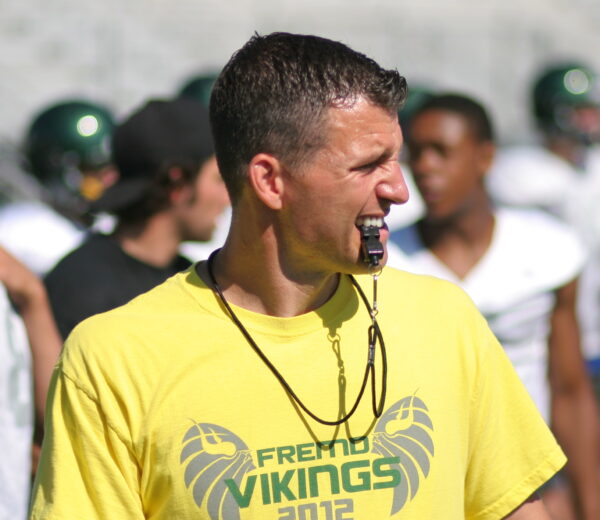
When asked about physicality and toughness, Lou Sponsel gets worked up and wants to show video.
When I attended a summer workout I saw toughness first hand. A running back took a big hit and went down. No one ran to him. A team of trainers didn’t rush onto the field. Coaches told him to get up. After sitting out one play, the running back returned. There is no question in my mind that Lou Sponsel has a hard-nosed football team.
Please don’t confuse the mantra of “Quality over Quantity” as a weak, indecisive, namby-pamby everyone-wins form of coaching. The opposite is true. If everything depends on quality, coaches need to be strong, direct, demanding, and insistent taskmasters. Coaches must demand top-speed at all times. Most kids have four gears and practice in 3rd gear. If your team practices less than five hours per week, your kids better be finding their 5TH GEAR. As a football coach, I would want 5th gear football players on Friday nights. You play like you practice.
Some of you are probably making the argument for the old-school way. Yep, lots of closed-minded tyrants have “good programs”. Coaches that do things wrong can still have good athletes. The best players usually win the game. Winning programs attract good athletes.
I believe coaches have a duty to make football a positive experience. The positive experience includes winning but there is so much more. Practice can not be a dark cloud in a kid’s life. In addition, we must remember that football is a part of the high school experience … just a part. If football becomes the be-all and end-all, we have failed. Even if we win every game, we have failed.
College football makes a mockery out of “student-athlete.” We are not obligated to adopt the modus operandi of college football.
Lou Sponsel gives us a blueprint to improve the football experience for high school athletes. “Sprint-Based Football” may also be the best way to win games.
Keep your minds open.
Please share this article so others may benefit.
[mashshare]
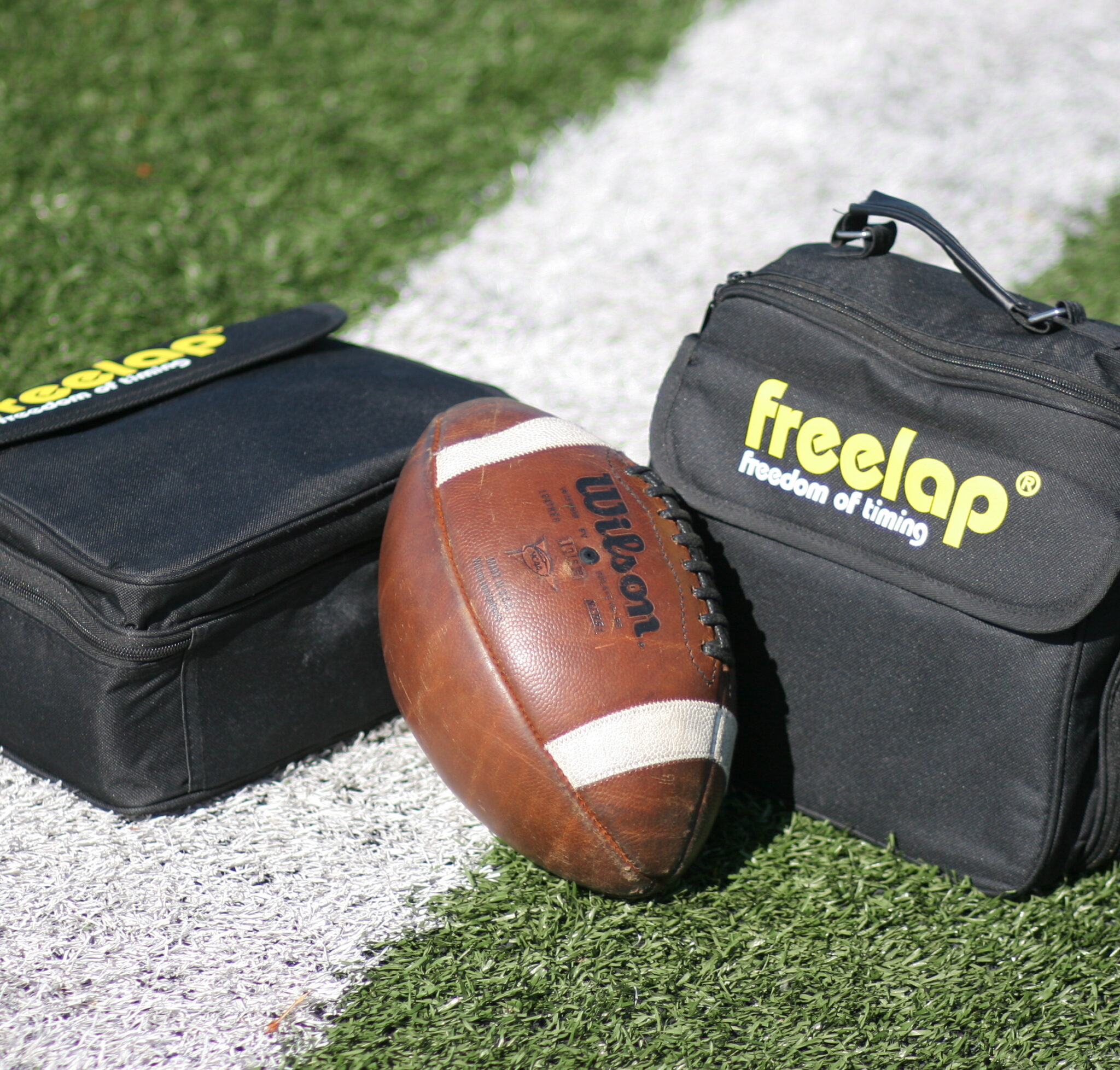


As a strength coach of a suburban high school who lives by less as more when training athletes this is a breath of fresh air! I recently had a heated discussion with the football coach regarding our off season program because while I like to use this time to work on mobility and teaching our athletes he wants 10 tuck jumps and 10 explosive push ups after every set of every exercise! I explained to him that this will have an adverse affect on technique and we will not get the athletes best and there is a possibility someone could get hurt. His response was this is needed to develop a tough mindset and to instill discipline! My response was you will never make a kid tough by making him sweat and that discipline should come from the coaching staff because after all they are kids. His response was I want our kids physically exhausted when they leave the weight room which is absurd because I was always taught that you should feel like you’ve trained when your done but could still play a quarter if need be cause we didn’t train to failure! Thank you for taking a stand on this issue and I completely agree with everything you said!
Lou Sponsel’s system sounds great on paper. The reality is Fremd looses to subpar competition. Their record has been 5-4 each year under Sponsel and they’ve lost every year in the first round of the playoffs. The team has much greater potential than the coaching staff gets out of them. The reality is there is a difference between track stars and football players. He chooses to develop track stars to play both ways on the field, not football players. And when you practice as little as Fremd does, track stars don’t make the tackle or get YAC or block on the edge. Remember the Renaldo Nehemiah experiment. It didn’t work then and it doesn’t work at Fremd or anywhere. Time for a change of ideas for Fremd Football. Winning football is played by tough football players, not track athletes.
Sean, since you remember the Renaldo Nehemiah experiment, do you remember the Bob Hayes experiment? Willie Gault? Julio Jones? Michael Carter? Adrian Peterson? Randy Moss? Bo Jackson? Deion Sanders? Antonio Brown? Jordy Nelson? I could go on and on and on and on and on. All outstanding track athletes. Around 60% of the NFL ran track in high school. I understand just saying, “Hey, you’re good at track so you must be good at football,” is a bit of a fallacy. But it’s a heck of a place to start.
Palatine Fremd’s three losses in the 2016 regular season were to Lake Zurich (7-2), Barrington (7-2) and Palatine (9-0). Doesn’t sound to me like they’re losing to subpar competition.
I have never coached football and can’t pretend to know what coaching style is best. I am wondering what your definition of a “tough” football player is?